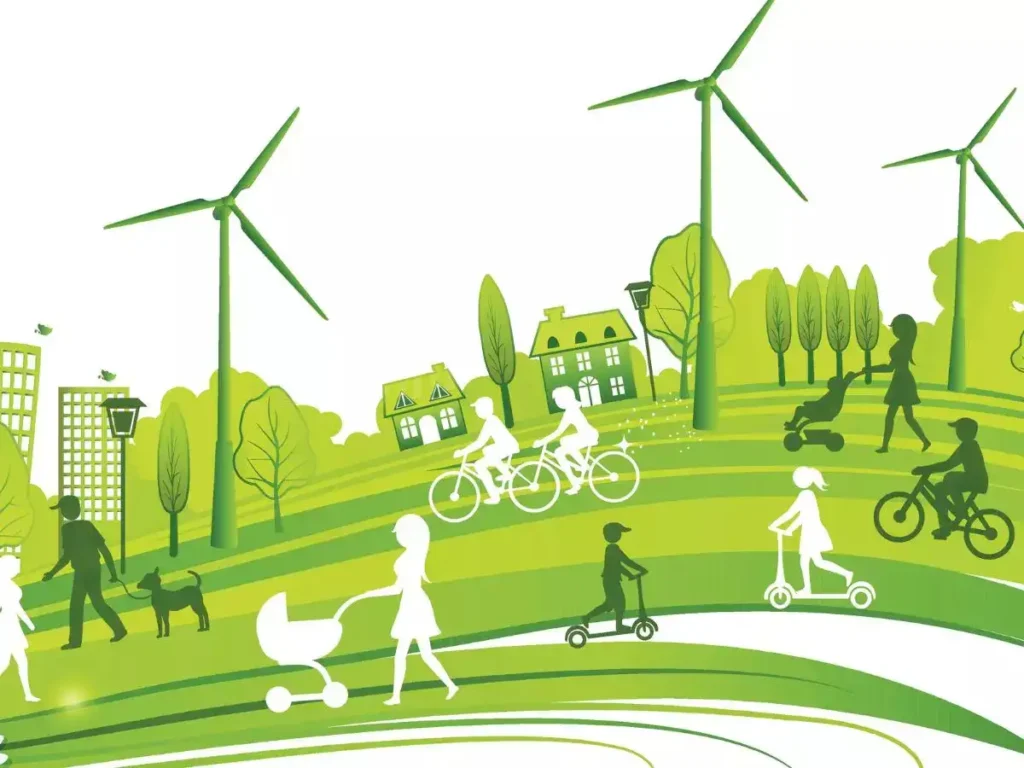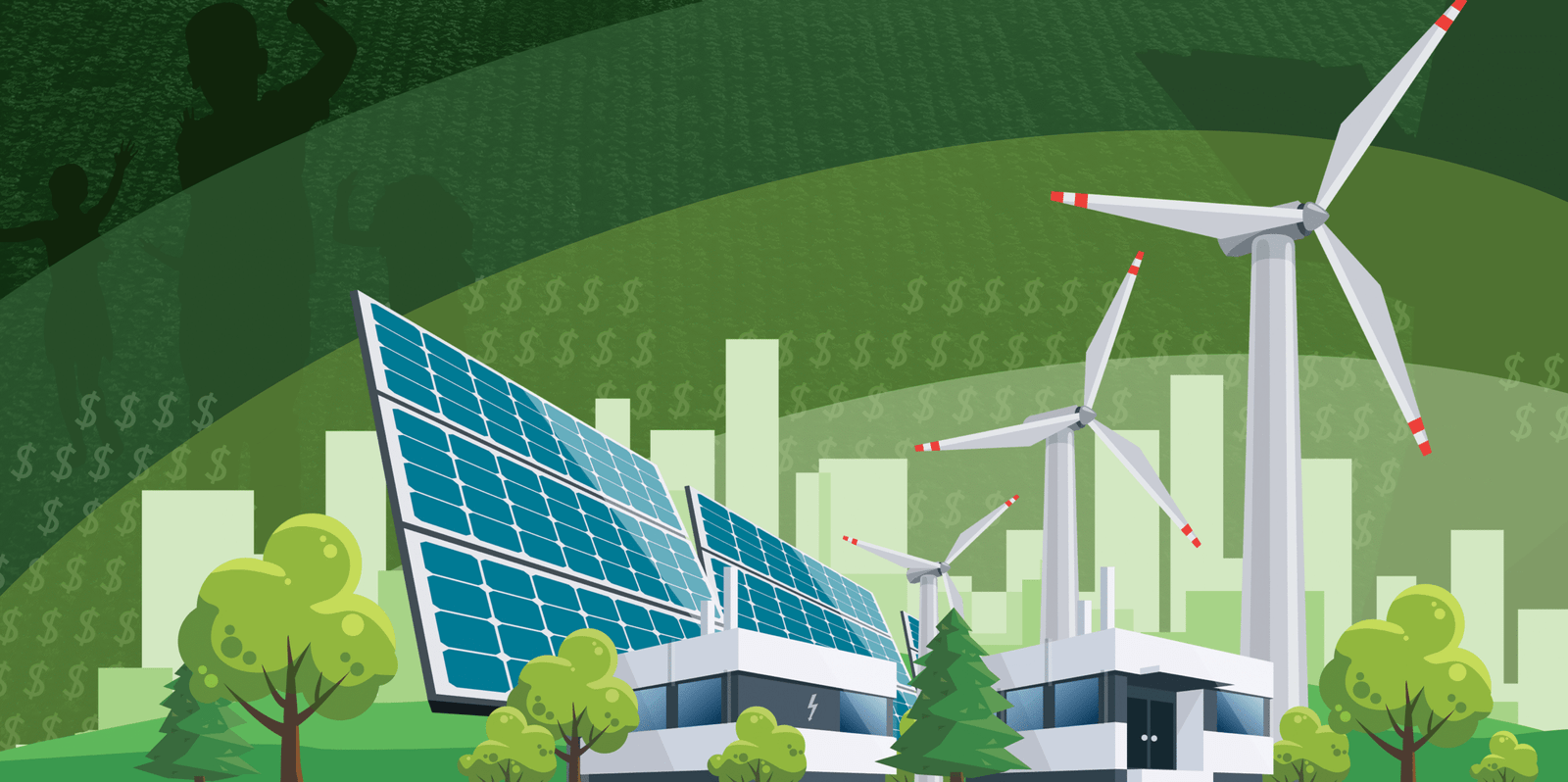In recent years, the global focus on environmental sustainability and combating climate change has given rise to what is known as the Green Economy. This new economic paradigm aims to foster growth and development while ensuring that natural resources are used responsibly and ecosystems are preserved. Central to the success of this transition are the Green Economy and Sustainability roles — the jobs and careers that are driving change toward a more sustainable world.
What is the Green Economy?
The Green Economy refers to economic activities that result in improved human well-being and social equity, while significantly reducing environmental risks and ecological scarcities. It encompasses sectors and industries focused on renewable energy, energy efficiency, pollution control, sustainable agriculture, conservation, and environmental protection.
Unlike traditional economic models that often prioritize short-term profits over long-term environmental health, the Green Economy integrates sustainability into its core principles, ensuring economic growth aligns with the planet’s capacity to regenerate resources.
Why Are Green Economy and Sustainability Roles Important?
Addressing Climate Change
The planet is facing an urgent climate crisis. Rising global temperatures, extreme weather events, and biodiversity loss are threatening the very fabric of life. Sustainability roles are vital in developing and implementing strategies to reduce greenhouse gas emissions, promote renewable energy, and manage natural resources responsibly.
Economic Growth and Job Creation
Far from being a limitation on growth, the Green Economy has proven to be a major source of job creation. According to the International Labour Organization, green jobs worldwide have been increasing steadily, offering new career opportunities in emerging sectors like solar power, wind energy, and sustainable transport.
Corporate Social Responsibility (CSR)
Businesses are increasingly aware that sustainability isn’t just an ethical imperative but also a strategic advantage. Companies invest in green roles to improve their environmental footprint, comply with regulations, and meet customer demand for sustainable products and services.
Emerging Green Economy and Sustainability Roles
As the world shifts towards sustainability, numerous job opportunities are emerging across different sectors. Let’s explore some of the key roles in demand today:
1. Sustainability Analyst/Manager

These professionals help organizations measure their environmental impact, develop sustainability strategies, and ensure compliance with environmental regulations. They analyze data related to energy use, waste management, and emissions, providing insights to reduce the carbon footprint.
- Average Salary: ₹5.6 to ₹16.2 Lakhs Per Annum (LPA) in India.
- Skills Required: Data analysis, environmental science, regulatory knowledge, project management.
2. Renewable Energy Engineer
Engineers in this field design, develop, and maintain renewable energy systems such as solar panels, wind turbines, and bioenergy solutions. Their work is crucial for increasing the share of clean energy in the overall energy mix.
- Average Salary: ₹6.4 to ₹15.3 LPA.
- Skills Required: Electrical/mechanical engineering, energy systems, software tools for modeling and design.
3. Environmental Consultant
Consultants assess the environmental risks of projects and advise businesses and governments on compliance, sustainability practices, and impact mitigation. They often conduct environmental impact assessments (EIA) and audits.
- Average Salary: ₹7.1 to ₹14.2 LPA.
- Skills Required: Environmental laws, risk assessment, communication, report writing.
4. Energy Auditor
Energy auditors inspect buildings and industrial processes to identify opportunities for energy savings. Their recommendations help reduce energy consumption, cut costs, and lower emissions.
- Average Salary: ₹5.2 to ₹9.4 LPA.
- Skills Required: Energy management, thermal systems, data analysis.
5. Project Manager – Governance & Compliance
These managers oversee sustainability projects, ensuring they meet legal and regulatory standards. They coordinate teams, manage budgets, and liaise with stakeholders to deliver projects successfully.
- Average Salary: ₹8.9 to ₹28.9 LPA.
- Skills Required: Project management, knowledge of governance frameworks, leadership.
Which Industries Are Driving Demand?
The demand for sustainability roles spans multiple industries:
Renewable Energy Sector
Solar, wind, hydroelectric, and bioenergy companies are the largest employers of green professionals. India, for example, has ambitious renewable energy targets and is investing heavily in solar parks and wind farms.
Manufacturing and Industrial Companies
These sectors employ environmental consultants and energy auditors to reduce pollution, manage waste, and improve energy efficiency.
Construction and Real Estate
Green building standards like LEED and IGBC are becoming mainstream. Sustainability managers ensure that new developments meet these eco-friendly certifications.
Agriculture and Forestry
Sustainable agriculture and conservation efforts require experts who can balance productivity with ecological preservation.
Government and NGOs
Public sector agencies and non-profits hire sustainability specialists to implement environmental policies and community projects.
Skills and Education Needed for Green Economy Jobs
To succeed in sustainability roles, candidates typically need:
- Educational Background: Degrees in environmental science, engineering, renewable energy, or related fields.
- Technical Skills: Proficiency in data analytics, Geographic Information Systems (GIS), environmental impact assessment tools, and energy modeling software.
- Soft Skills: Critical thinking, project management, communication, and collaboration.
- Certifications: Programs like LEED Accredited Professional (LEED AP), Certified Energy Manager (CEM), and Sustainability Excellence Associate (SEA) add value.
Many universities and online platforms now offer specialized courses and certifications catering to these needs.
Challenges in the Green Economy Job Market

While opportunities are growing, some challenges persist:
- Skill Gaps: Rapid evolution in technologies requires continuous learning.
- Regulatory Complexity: Navigating diverse environmental regulations across states and countries can be challenging.
- Funding and Investment: Sustainable projects sometimes face financing hurdles, especially in developing regions.
- Market Awareness: Some companies are still hesitant to fully integrate sustainability into their business models.
The Future Outlook
The future of green jobs looks promising. Governments worldwide, including India’s, are committing to net-zero targets and launching massive green infrastructure projects. The private sector is also increasingly adopting Environmental, Social, and Governance (ESG) criteria to attract investment.
Predicted Trends:
- Expansion of Green Finance: Roles in sustainable investing and green bonds.
- Circular Economy Experts: Professionals focused on waste reduction and resource reuse.
- Climate Risk Analysts: Specialists assessing climate impacts on businesses.
- Innovation in Clean Tech: Careers in emerging technologies like hydrogen fuel and energy storage.
How to Prepare for a Career in Sustainability?
- Stay Updated: Follow industry news, regulations, and innovations.
- Gain Experience: Internships, volunteering, or projects with environmental organizations.
- Build a Network: Join sustainability forums, attend conferences, and connect with professionals.
- Develop Interdisciplinary Knowledge: Combine technical expertise with business acumen and policy understanding.
Conclusion: Making a Difference Through Green Economy Roles
Green Economy and Sustainability roles represent more than just job opportunities—they are a pathway to contribute meaningfully to the planet’s future. By pursuing careers in these fields, professionals help combat climate change, protect ecosystems, and build resilient communities.
As countries invest billions into sustainable development, these roles will become increasingly vital and rewarding. Whether you’re a student, a professional seeking a career switch, or a company aiming to be more sustainable, understanding and engaging with the Green Economy is essential for a prosperous and sustainable future.



